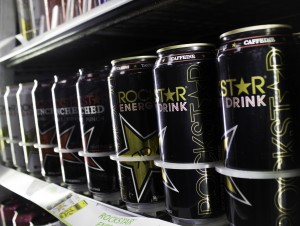
Since Red Bull was introduced to the United States just over one decade ago, energy drink use has risen considerably as a method for staying awake and active. However, the ingredients included in these drinks may cause some negative long-term effects for frequent consumers.
There are more than 130 different brands of energy drinks, one of which has the caffeine equivalent of 14 cans of a normal soda, according to a study done at Johns Hopkins University School of Medicine. The problem with such high levels of caffeine is that they can lead to harmful health consequences.
“One such adverse effect is caffeine intoxication, a recognized clinical syndrome included in the Diagnostic and Statistical Manual of Mental Disorders,” the Johns Hopkins study said.
The study mentions anxiety, restlessness, insomnia, tremor, gastrointestinal upset, tachycardia and other symptoms as possible effects of caffeine intoxication. The amount of caffeine in energy drinks is much more than that found in other caffeinated beverages.
“Any cola drink is well below an energy drink in caffeine levels, especially energy shots,” said Rickelle Richards, PhD, MPH, RD, of the BYU department of Nutrition, Dietetics and Food Science. “So this is definitely why there is concern among health professionals about energy drinks, specifically because the level of caffeine in them is well above anything you would drink in a soda.”
Caffeine, however, isn’t the only advertised ingredient meant to boost energy levels. B vitamins are often marketed as energy-improving supplements.
“B vitamins are used in energy metabolism,” Richards said. “But if you aren’t already deficient in B vitamins, then taking more isn’t gong to increase your energy levels.”
In the United States, most grains are already enriched with B vitamins, so most people are already getting enough, according to Richards.
“My opinion is that it is mostly the caffeine that affects the energy levels,” Richards said. “But we also can’t tease out any single ingredient to know exactly what is affecting energy.”
In limited amounts, caffeine is known to help with headaches, which is why senior Ian Anderson tried his first Rock Star last Thanksgiving.
“I probably drink about two a month,” said Anderson, an industrial design major from Washington. “Only when I really need a boost or have a headache. Because I don’t drink it often, it works really well.”
The drink will leave Anderson feeling jittery for a couple of hours after drinking a whole can, but the effects don’t last much longer than that.
“I use it as a tool,” Anderson said. “I don’t see it as a beverage I like to drink; I see it as something that can be useful.”
Senior Rachel Crawford, a dietetics major from Texas, watched some of her friends in high school drink energy drinks, but decided against them for herself because of the crash that often follows and possible health risks.
“I think a lot of people try and cheat and do the energy drink thing,” Crawford said. “But it is more healthy to do the natural things that you are supposed to do like sleep and get enough to eat every day.”




